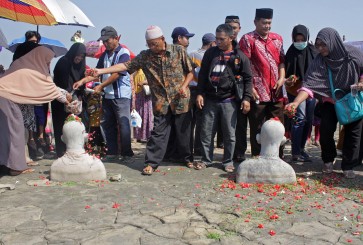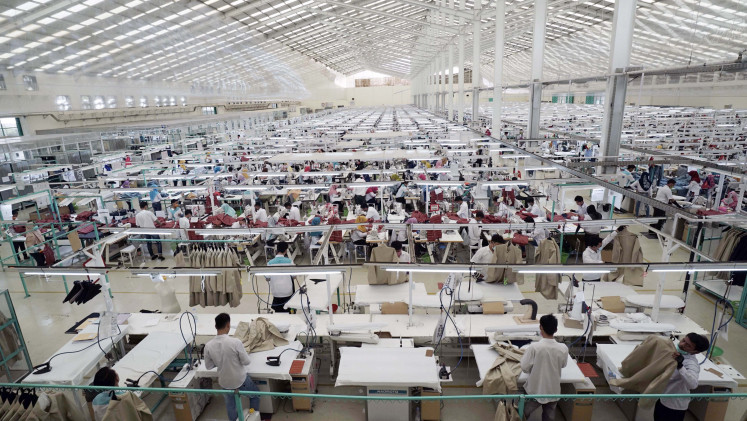Police, divine intervention in national education
With National Police deploying plain-clothes officers to maintain security at schools organizing istighosah (mass prayers) for students requesting divine intervention to help them pass the national examinations, something is clearly going wrong with Indonesia’s education system
Change text size
Gift Premium Articles
to Anyone

W
ith National Police deploying plain-clothes officers to maintain security at schools organizing istighosah (mass prayers) for students requesting divine intervention to help them pass the national examinations, something is clearly going wrong with Indonesia’s education system.
There was nothing inspirational or educational, either, when we saw police officers guarding the delivery of test materials and students looking distressed as they recited prayers during the istighosah, which is originally a way Muslims humbled themselves and got closer to Allah in times of trouble.
The Prophet Muhammad was said to have held an istighosah when he was at war.
Apparently the infliction of law enforcers upon teachers and students inspired a more public display and collective measure of students’ relationship with God, at least for the Muslims among them. Non-Muslims seemed to be content with praying individually at home.
Such bizarre events leading up to the national exams should at least prompt the National Education Ministry to question whether the government-sanctioned final exams are heading in the right direction.
Indonesian students have been subjected to the national standard exams since 1965, the ministry says. There had always been extra, perhaps necessary, pressure for students, but this took a new turn in 2003 when the government of former president Megawati Soekarnoputri declared the national exams the only means to determine students’ graduation.
The education ministry said the policy was aimed at improving the quality of education in Indonesia and setting a minimum standard nationwide.
Decades of centralized development in the past had left eastern Indonesia and remote regions trailing behind Java, and the government assumed this measure would rectify the situation.
One of the clearest examples of the excesses of the national exams as the single determinant of childrens’ learning is the increasing prevalence of cheating. Over the last eight years cheating has been pushed to new levels: now entire schools cheat and principals even sponsor it.
The government has responded in kind. In 2008 the Detachment 88 counterterrorism unit arrested 16 teachers and a principal in Deli Serdang, North Sumatra, for allegedly leaking final exam materials to students.
Most recently, law enforcers threatened to charge those found illegally distributing test materials with the same law applied for people caught leaking state secrets.
Parents, teachers, human rights activists, child protection activists and education experts have long criticized the national exams. The Supreme Court in 2009 upheld a lower court ruling in favor of plaintiffs who had filed a citizen’s lawsuit against the national exams.
The court ordered the government to freeze the exams until it could close the well-documented education quality gap among Indonesia’s regions.
But the government ignored the verdict, despite the fact it was supposedly legally binding. The national exams took place last year and this year the government only changed the weight of the national exams to 60 percent of the pass grade.
While the public has never stopped protesting against the national exams, only partial changes to the system have been made. But now, after several alterations, including remedial tests last year and a reduction of the exams’ weight this year, the national exam has strayed from its original design as a rigorous national benchmark.
In its defense, the education ministry said that apart from improving the quality of education, the national exams would also provide policy makers with a long-awaited map of the state of education in provinces across Indonesia, to be used to establish budget allocations and decide what improvement programs were necessary.
The cheating factor, however, has rendered the national mapping of the quality gap useless. It is very hard for policy makers to design improvement programs based on numbers of students who don’t pass the national exams in each region, because the data may not be valid.
West Papua is a good example. Students majoring in social sciences in the province, known as a disadvantaged region, recorded a higher failure rate than the national average in 2008 and 2009, and ranked 22nd and 30th in those years. In 2010, however, West Papua leapt to 15th place, eclipsing Yogyakarta. Traditionally regarded as Indonesia’s student city, Yogyakarta came in at the bottom of the country’s 33 provinces.
Interestingly, the ministry channeled Rp 100 billion (US$11.63 million) into an additional education budget for West Papua last year, instead of Yogyakarta.
But this dubious data clearly fails to show us where the national exams have been heading to since the overhaul in 2003, and it is also unsafe to say the overhaul has improved our education system.
The current design of the national exams has thus betrayed at least two of the exams’ original objectives, which are to improve the quality of education by closing the gap
between disadvantaged and privileged regions and to provide a map for the policy makers to know where we stand.
Even worse, the government’s efforts to adjust the national exam to pacify protests and to minimize cheating have derailed the exam into a new benchmark system where police and divine intervention is a necessity.
May God help us all, anyway.
Over the last eight years cheating has been pushed to new levels: now entire schools cheat and principals even sponsor it.
The author is a staff writer at The Jakarta Post.









